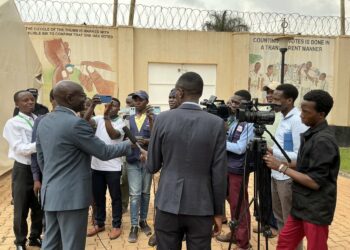I have been deeply troubled by the resurgence of tribal sentiments in Uganda, particularly on social media. Regardless of the content or context of these statements, I firmly disagree with the propagation of tribalism. Such divisive rhetoric is not what leaders are expected to promote. It is high time that we, as Ugandans, cast aside the specter of tribalism and raise real issues that will move Uganda forward. We have come a long way, surmounting numerous challenges, and we must resolutely reject any return to the dark days of tribal divisions. Tribalism should no longer be permitted to occupy center stage in Uganda’s discourse. Instead, let us direct our attention to issues that unite our country, for tribalism is the last thing Uganda needs amidst the myriad of pressing concerns.
The recent revelation by the Inspector General of Government that corruption costs our nation at least Shs9.1 trillion every other year should be a rallying point for leaders of the future. What are leaders of the future saying about this? We must prioritize addressing this scourge over engaging in tribalism. Additionally, the Uganda Bureau of Statistics (UBOS) reports a distressing statistic: 9.3 million youths, constituting 41 percent of our youth population, are neither in education, employment, nor receiving training. As aspiring leaders, we are duty-bound to provide viable solutions to combat this pressing issue of unemployment. Should tribalism be a concern?
With a projected population exceeding 100 million people by 2050, Uganda’s future is teeming with opportunities. Our leaders must focus on capitalizing on the potential inherent in this burgeoning population, as well as addressing other issues that genuinely matter to Ugandans. Raising alarm bells that could potentially incite unrest only serves leaders bereft of ideas to propel our country forward.
Despite grappling with the challenges posed by the COVID-19 pandemic, Uganda’s tourism sector is demonstrating signs of recovery. In 2022, Uganda welcomed 814,508 tourists, contributing $736 million to our nation’s coffers. Regions like Kigezi, renowned for its breathtaking natural wonders, require substantial investment in infrastructure development. These are the areas our leaders should be passionately championing, harnessing Uganda’s abundant resources for development. After all, tourism represents one of Uganda’s top foreign exchange earners and has the potential to employ hundreds of thousands of unemployed youth. Why, then, should we waste our energy on tribal sentiments?
Morocco, Africa’s leading tourist destination (8.7 million tourists in 2022), recently set aside USD $598.6 million with the aim of attracting 17.5 million tourists, generating USD $11.9 billion in tourism revenue, and creating 200,000 new jobs by 2026. What sets Morocco apart? Organized cities, an efficient tourism sector, and a supportive government. Earlier this year, the Cable News Network (CNN ) named Uganda as one of the world’s top tourism destinations, boasting Lake Victoria’s expansive shores, the snow-clad Rwenzori mountains, and rich wildlife. Why should our future leaders not raise the issue of a disorganized Kampala City, Traffic Jams, and pothole-ridden roads, and explain to Ugandans the solutions they suggest to end all this? And why should tribalism be an issue, anyway, to conquer our Twitter handles for almost a week? We must identify our most pressing issues as a nation and address them cohesively.
Throughout history, tribalism has wrought destruction, spawning oppression, violence, and the fragmentation of nations. We need to look no further than the tragic example of Rwanda to grasp the dire consequences of tribal sentiments. Tribalism breeds division, undermining our shared humanity. As a nation, we must rally around what unites us rather than what divides us. Future leaders of Uganda should embrace the diversity within our many tribes, leveraging it as a stepping stone for our nation’s development. Dividing a country, where each group prioritizes its interests over the collective good, should never be an option.
Instead of sowing the seeds of tribalism to secure votes, let us champion ideas that will propel our country’s progress. In the words of Dambisa Moyo, the Zambian-born economist and author, ” The greatest threat to any nation is not external enemies but internal divisions fueled by tribalism.” Let our wisdom be founded on unity, development, and progress, not divisive tribal lines.
As we march into the future, let us unequivocally reject tribalism and devote our energies to the issues that truly matter to Uganda and her people. Together, we can forge a brighter future for our beloved nation.
Wilfred Arinda
LC5 Male Youth Councillor for Rubanda District
Email: wilfredarinda@gmail.com
Do you have a story in your community or an opinion to share with us: Email us at editorial@watchdoguganda.com













